When travelling to different countries you will notice many differences, especially when in Barcelona. The food, the history, the culture, the traditions, they all differ from our own at home. With this in mind we must also take into account the important differences such as recycling and disposing of your rubbish.
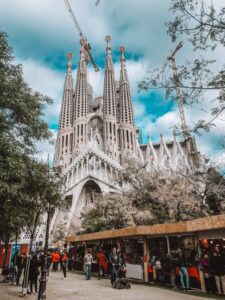
In Barcelona, you will be able to notice that the rubbish bins are much different to those you would see around England or China for example. Not only is it necessary to understand this to be respectful of the country which you are visiting, but also we should be making a consistent effort to save the planet. Recycling saves resources, prevents pollution, supports public health, and creates jobs.
Over 70% of the Spanish population recycle their rubbish, and this is only possible due to the adequate means Barcelona offers for people to do so.
Why recycle?
We produce waste daily as a result of our daily activities. These products are no longer useful to us and often are thrown away, but if you recycle them they can be reused to create new products and resources where possible. Making the effort in your home to take the first step in the separation of waste at home is a great way of contributing to lower environmental, economic and social costs.

Barcelona is one of the most polluted areas in Spain, caused by nitrogen dioxide, traffic, and ozone, which is prevalent during hot weather. Therefore it is principal that we make the effort to help reduce emissions into the atmosphere of the polluting gases. This is possible through giving a second life to products we no longer use; organic waste can be turned to biodiesel or fertiliser, plastic can be reused for products in industry and recycled glass can be made into new packaging.
To aid this process and encourage people to recycle, Barcelona has ensured that citizens of Barcelona all have recycling collection containers located less than 100 metres from their home.
How to recycle in Barcelona
Colours of the containers
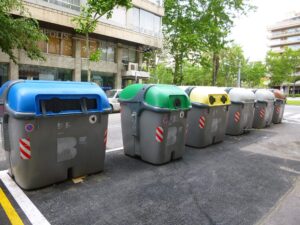 Yellow container: for plastic packaging like bottles, cans and plastic bags
Yellow container: for plastic packaging like bottles, cans and plastic bags
Green container: for glass bottles and jars
Blue container: for paper and cardboard
Brown container: for organic waste like food, gardening waste and cork stoppers
Grey container: for the rest of the remaining waste
The yellow containers
The yellow containers should be utilised for plastic (water bottles, plastic bags, yogurt containers etc), cans, milk and juice cartons, aluminium foil, metal lids and different wrappers. These containers can even be found at the beach beside the grey ones.
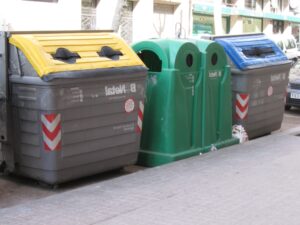
The cartons put in the yellow containers are sent to sorting plants, separated into various materials, then compacted, packaged and sent to recycling centres.
Green containers
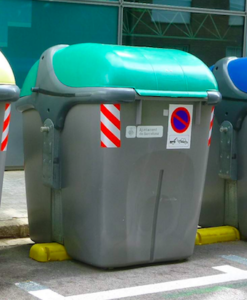
The green containers are for glass, not broken drinking glasses, ceramics, mirrors, dishes or lamps. These objects are suitable for a punto verde (a green point in the city- there are over 130 in Barcelona).
The glass is taken to recycling plants where their cleaning materials are extracted with ferric magnets and crushed to be converted to powder. Then it is able to be reused and manufactured into new glass products such as bottles, jars and light bulbs.
Blue containers
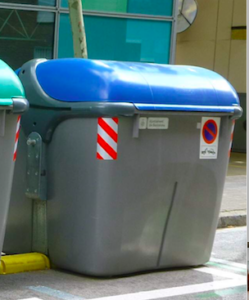
The blue containers are for packaging and cardboard boxes, newspapers, magazines, books, envelopes, paper bags, sheets, and wrapping paper. These containers are not for napkins, paper towels stained with oil (brown container), milk cartons (yellow container) or pizza boxes (grey container).
This waste is then delivered to recycling plants where they become large bales of shredded paper. These are soaked for paper pulp, which is then strained to filter the ferrous materials. The resulting paste is dried, ironed and made into reels which are sent to paper mills to get a new life.
Brown containers
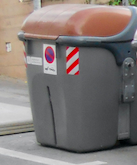
In the brown container you can put organic substances of animal or plant origin which decompose biologically. Specifically this refers to meats, fish, bread, fruit, veg, nuts, eggshells, tea bags, napkins etc. Do not deposit animal faeces, diapers, hair, fur or dirt in these containers.
These substances are then degraded biologically after they are delivered to eco parks, becoming compost and biogas.
Grey containers
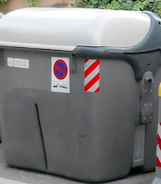
The grey containers are used for regular rubbish, basically anything that cannot be recycled. This includes such things as cigarette ends, sanitary towels, diapers, debris, cotton, hair, pens and pencils, animal faeces.
This rubbish is then separated into paper/cardboard, packaging, glass and other materials to try to integrate them into the recycling chain. For the waste which cannot be recycled, this is delivered to landfills or to be incinerated.
If you are still confused about where your waste should go you can go to the official Barcelona website, type in the type of rubbish you’re wanting to dispose of, and your address. This will then give you all the information you need on where, how and what time to dispose of your rubbish.
Other types of waste removal
Pneumatic collection
This service is available throughout the city. The pneumatic collection service is a number of waste points which are connected to a central suction point by underground pipes. These types of bins are useful for avoiding odours, reducing traffic and improving the visual impact of waste. They are available throughout the day.
Manual bag collection service
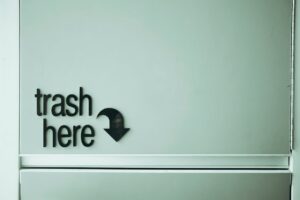
These waste collection services are in unique zones within the city. This system has restrictions on time, avoiding full containers all day and therefore rodents or bad odours. This takes place Monday to Sunday, bags of rubbish can be placed in the street in front of the doorstep between 8pm and 10pm.
Green dots
Barcelona has 7 zone green dots, 28 neighbourhood green points, 97 mobile green points stops and 1 school mobile green point for recycling waste that can’t be thrown into street bins. Green dots are used to rid waste that cannot be put into street containers. This process aims to improve recycling and preserve the environment.
Recycling used clothing
Roba Amiga Programme
 Translating to ‘friendly clothing’, this service is an employment project which aims to reuse old clothes and accessories in good conditions for those with special difficulties. This way they are also reducing the amount of rubbish delivered to landfills. They collect everything from clothes for home and clothing, shoes, handbags and accessories. They do not take textile waste, wet clothes or unusable clothing.
Translating to ‘friendly clothing’, this service is an employment project which aims to reuse old clothes and accessories in good conditions for those with special difficulties. This way they are also reducing the amount of rubbish delivered to landfills. They collect everything from clothes for home and clothing, shoes, handbags and accessories. They do not take textile waste, wet clothes or unusable clothing.
Barcelona has been rated to be one of the most sustainable locations to travel to, making it ideal for holidays this summer. If you are looking for apartments to stay in for a short holiday this summer, look no further than AB Apartment Barcelona, who stand at the forefront of sustainability.

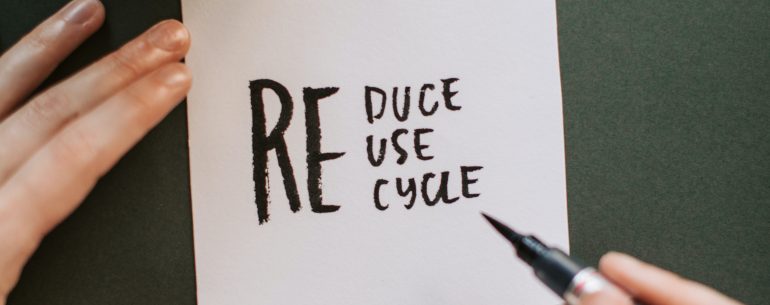


Leave a Reply